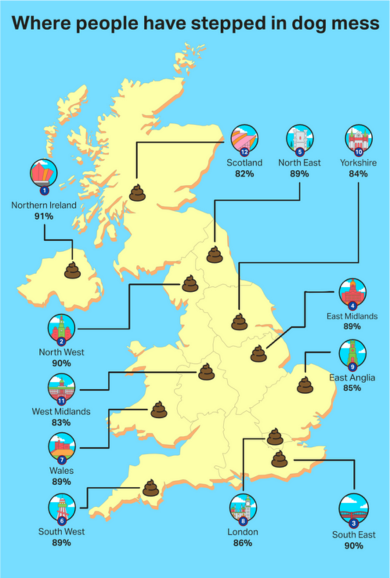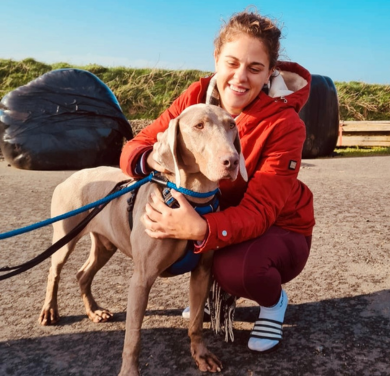Scoop the Poop
Tackling dog fouling on the rugby pitch and beyond

We’ve joined forces with the Welsh Rugby Union to help tackle the issue of dog fouling on rugby pitches.
Our research showed it’s a major issue for teams, with 83% of grassroots rugby clubs having to remove dog mess before or during training and matches and 29% having to do so every time the team plays.
Natalia John, Welsh Rugby Union player and dog owner, providers her own insight on how dog fouling can impact sport and how communities can help protect their clubs.
We also found that 20% of dog owners don’t pick up their dog’s mess every time – and that’s why we’ve teamed up with the dog behaviourist Leon Towers to share his advice on how we can work together to prevent dog fouling.
The issue of dog fouling

It's estimated that the dog population of the UK produces more than 1,000 tonnes of poo every day…

…This is equivalent to the weight of more than 250 African elephants.

One gram of dog poo contains an average of 23 million bacteria which can be harmful to humans and wildlife.

87% of people admit to having stepped in dog poo.

36% of those playing field sports said club members and spectators have had to pick up dog poo from the pitch.

Oxford comes out top, where 76% of people say they are most likely to confront someone walking their dog and not picking up their dog's mess. Those from Cardiff (57%), Sheffield (57%), Manchester (56%), York (56%) and Birmingham (55%) are least likely to do so.

Our research has found that 91% of people from Northern Ireland admit to having stepped in dog mess – followed by those from North West and South West England. Those from the West Midlands were least likely to.
What rugby clubs are doing to tackle dog fouling
Almost three in five clubs (58%) have taken specific measures to prevent dogs from fouling on their pitch or playing field, and many more clubs are considering doing so (17%).
One rugby club spent £35,000 erecting fences around two pitches to stop the issue of dog fouling from impacting their matches.
Another council-owned ground were forced to put up signs saying no dog fouling - but when the notices weren’t adhered to and team members approached those not picking up after their dog, they were met with hostility.
Two other rugby clubs attempted to stop unauthorised access and dog fouling by putting padlocks on the gates to their pitches, but both clubs reported these security measures were cut off by angle grinders.
Grassroots clubs aren’t just putting in physical barriers to reduce the impact of dog fouling. One club went a step further and successfully achieved a council protection order for their playing field.
Natalia John on the issue of dog fouling

Natalia John is a Welsh Rugby international player and dog owner.
She gives her insight on how dog fouling can impact sport and how communities can help protect their clubs.
"Rugby is so special to me, and it’s had such a positive impact on my life. In my early years of playing, I experienced a match being postponed due to dog fouling on the pitch and I can see why it’s having a big impact on my sport."
"Now more than ever, we need to protect the clubs in the community by saving them the time and resources they would use for preventing or picking up dog poo. I always make sure that I’ve got enough dog poo bags when I’m walking my Weimaraner, Ned, and although it’s not pleasant job, it’s an easy one."
Tips from dog behaviourist Leon Towers

Leon Towers says:
"All pet owners must take full responsibility to pick up their dog’s poo. All animal faeces contain bacteria that can cause an upset stomach, but dog fouling is crucially harmful to other animals and people, and pollutes local environments."
"If you come into contact with dog poo, you must wash your hands and any clothing with warm, soapy water. If it comes into contact with any cuts, your eyes or is ingested, make an urgent GP appointment or call 111."
Leon shares his advice on how we can work together to stamp out the issue of dog fouling:
- keep poo bags on you at all times – including in your outdoor clothing and anything you wear when dog-walking, so you’re never caught off guard
- pay attention to your dog – it’s your responsibility to be aware of when and where your dog is going to the toilet
- keep your dog on a lead until they’ve pooed – you should have an awareness of your dog’s bowel movements and if you don’t, you risk not knowing if your dog is ill with loose stools or constipation
- ask for help – if you do forget poo bags, ask a passer-by or other dog walkers if they have any on them
- most importantly – see it, bag it, bin it!
How to report it
You can report a dog fouling problem in a public area such as parks, playgrounds or pavements, via your local council.
England and Wales
Report a dog fouling problem | GOV.UK
Northern Ireland
Local councils in Northern Ireland | nidirect